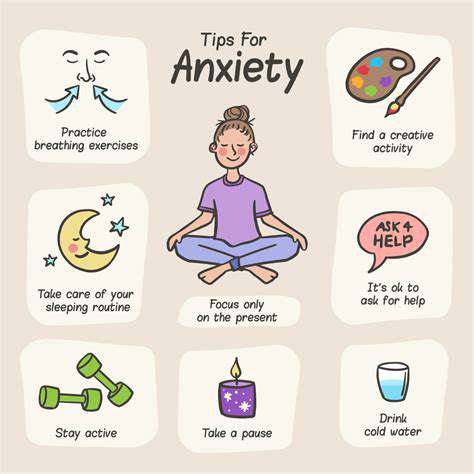Symptoms of Anxiety Accompanied by Shaking: What to Know
When to Seek Professional Help for Anxiety and Shaking
Recognizing the Signs of Escalating Anxiety
Experiencing occasional anxiety is a normal part of life, but when these feelings become persistent, overwhelming, and interfere with daily functioning, it's crucial to seek professional help. Noticeable changes in your behavior, such as avoiding social situations, withdrawing from loved ones, or experiencing significant changes in sleep patterns, could indicate that your anxiety is escalating beyond a manageable level. Pay attention to the intensity and duration of these feelings; if they are impacting your overall well-being and ability to perform routine tasks, professional intervention might be necessary.
Physical Manifestations that Warrant Attention
Anxiety often manifests physically, and these symptoms can be surprisingly diverse. Persistent feelings of restlessness, rapid heartbeat, shortness of breath, or excessive sweating might be warning signs that your anxiety is escalating. Additionally, physical tremors, or shaking, could also be a symptom requiring attention. If you're experiencing these physical sensations frequently or intensely, consulting a healthcare professional is a vital step in determining the underlying cause and developing an appropriate management strategy.
Impact on Daily Life and Relationships
Anxiety doesn't just affect your emotional state; it can significantly disrupt your daily life and relationships. If you're experiencing difficulty concentrating, making decisions, or completing tasks at work or school, this could indicate a need for professional intervention. Similarly, strained relationships due to irritability, withdrawal, or difficulty communicating effectively are strong indicators that you might benefit from professional guidance in managing your anxiety.
When Shaking Becomes Persistent or Uncontrollable
While occasional trembling or shaking might be associated with anxiety, persistent or uncontrollable shaking is a serious concern. If the shaking is disruptive to your daily activities, impacting your motor skills, or accompanied by other symptoms like dizziness or lightheadedness, it's essential to seek immediate medical attention. This could be a symptom of a more serious underlying condition, and a medical professional can determine the appropriate course of action.
Seeking Support Beyond Medication
While medication can be a valuable tool in managing anxiety, remember that professional help extends beyond just pharmaceutical interventions. Therapy, support groups, and mindfulness techniques can provide valuable coping mechanisms and strategies for managing anxiety. A comprehensive approach that integrates various forms of support can significantly improve your ability to navigate anxious feelings and develop healthier coping mechanisms. Exploring these options alongside medication, if prescribed, can lead to a more holistic and effective approach to managing anxiety and shaking.
Managing Anxiety and Reducing Shaking

Understanding the Root Causes of Anxiety-Induced Shaking
Anxiety is a complex emotional response that can manifest in various physical symptoms, including shaking. Understanding the underlying causes of this physiological reaction is crucial for effective management. Often, anxiety stems from a combination of factors, such as stress, worry, or fear. These feelings can trigger a cascade of hormonal changes in the body, leading to increased adrenaline and norepinephrine levels. This surge in neurochemicals prepares the body for a perceived threat, resulting in a physiological response that includes shaking, rapid heartbeat, and shortness of breath.
Identifying the specific triggers and stressors contributing to anxiety is a key step in developing a personalized approach to coping. Recognizing patterns in your reactions to specific situations or thoughts can help you understand how anxiety impacts your body and mind. This awareness allows you to develop strategies to manage and reduce your anxiety levels, ultimately minimizing the physical manifestations like shaking. Proactively addressing these triggers can significantly improve your overall well-being.
Effective Strategies for Managing Anxiety and Reducing Shaking
Implementing coping mechanisms to manage anxiety is essential for reducing physical symptoms like shaking. These techniques can range from simple relaxation exercises to more structured therapeutic approaches. Deep breathing exercises, for example, can help regulate the body's response to anxiety by slowing down the heart rate and promoting a sense of calm. This technique involves focusing on the breath, inhaling deeply and slowly, and exhaling completely, allowing the body to gradually return to a more relaxed state.
Mindfulness practices, such as meditation and yoga, can also be beneficial in managing anxiety. These practices encourage present-moment awareness, helping to detach from anxious thoughts and feelings. By focusing on the present, you can reduce the intensity of anxiety-provoking thoughts and decrease the physiological responses, including shaking. Mindfulness can be a powerful tool for gaining control over your thoughts and emotions, ultimately reducing anxiety and its physical manifestations.
Cognitive behavioral therapy (CBT) is another effective approach to managing anxiety. This type of therapy helps identify and challenge negative thought patterns, which can significantly contribute to anxiety. By learning to reframe anxious thoughts in a more balanced and realistic way, you can reduce their impact on your body and mind, and consequently, the shaking associated with anxiety.
Seeking support from mental health professionals is crucial in managing anxiety and reducing shaking. A therapist can provide personalized guidance and support in developing coping mechanisms that work best for you. They can also help you identify and address any underlying mental health concerns that may be contributing to your anxiety.